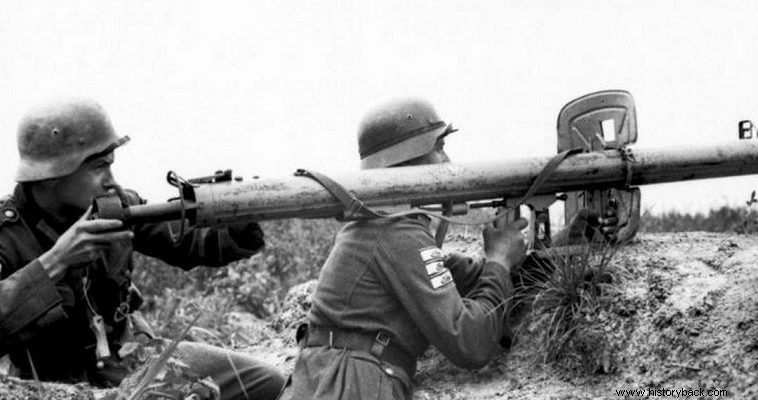
Sergeant Rudy Brasche and the team of tank hunters of the 2nd Platoon, 1st Company, 901st Panzergrenadier Regiment Lehr, which he commanded, equipped with a Panzerschreck – the equivalent of the German Bazooka – with mines and grenades, approached the edge of the narrow road, where it formed an angle of almost 90 degrees, and took cover in the trees.
Brasche was about to order the squad forward when Private Langerman told him, "Tanks on the left, Rudy." Brasche heard the noise of many chariot engines. A few moments later the first Sherman camein sight . It was followed by others.
The British tanks moved slowly and cautiously. Without, perhaps, knowing it, the British had found themselves on the side of the German company. Among them and in the company there was only the group of Brache. The sergeant ordered a man to inform the company.
He grabbed the Panzerschreck and took up a position on the side of the road, covered in vegetation. He let the lead chariot get close enough and pulled the trigger. The hollow charge rocket hit the Sherman in the turret at very close range, causing the turret to detach.
Immediately he called out, "Follow me." Immediately Privates Keck, Langerman and Hill followed him carrying the Panzerschreck projectiles as well.
“Quickly. If we destroy even the last tank of the phalanx we will trap them in the narrows", shouted the sergeant. At the same time the British were opening fire. Passing through enemy machine gun fire, the sergeant and his men moved parallel to the road in order to reach the entrance to the narrow.
They succeeded, and Brache moved to the side of the road and took up a firing position, through the vegetation. One of his men loaded the Panzerschreck and Brasche pulled the trigger. This time his rocket penetrated the tank's armor and hit its ammunition. A few moments after the impact, the tank was literally blown apart by a terrifyingly powerful explosion, which almost killed the German hunters as well.
But suddenly British infantry also appeared. A German mortar began to fire at them, its fire clearly audible, from Brasche and his three men, who were alone in the enemy's line of advance.
“Hill, Langerman, follow me. Kek cover us," he shouted. They ran parallel to the road, through the vegetation. Suddenly they fell upon the British. Brasche opened fire on them with his submachine gun, forcing them to take cover.
At the same time Hill, holding a Hafthohlladung hollow-charge mine, climbed onto the Sherman and tried to open the crew chief's hatch. He was lucky he didn't have insurance. Within moments, he armed the mine, threw it into the chariot and jumped away from it as fast as he could. He had only 7.5 seconds before he died himself.
A muffled explosion was heard and the chariot was destroyed. Braske, firing short bursts, advanced further and saw another Sherman. The sergeant grabbed four grenades from his belt, strapped them together and rushed towards the tank , while his men were covering him, with their fire, from the British infantry.
He climbed into the tank, dropped the grenade beam on the tank's engine covers, and jumped off it as fast as he could, reaching his men in a tumble as the grenade beam blew up the tank's gasoline engine. The Gasoline it was thrown everywhere and the chariot caught fire. Its crew, frightened, abandoned it.
Brasche, chair, joined his men. Another, typical, engagement for the German tank hunters had ended successfully.
